Use this nursing care plan and management guide to provide care for patients with inflammatory bowel disease (IBD). Enhance your understanding of nursing assessment, interventions, goals, and nursing diagnosis, all specifically tailored to address the unique needs of individuals with IBD.
What is Inflammatory Bowel Disease?
Inflammatory bowel disease (IBD) is a group of chronic disorders that result in inflammation or ulceration (or both) of the bowel. IBD is an idiopathic disease caused by a dysregulated immune response to host intestinal microflora. It results from a complex interplay between genetic and environmental factors. Similarities involve (1) chronic inflammation of the alimentary tract and (2) periods of remission interspersed with episodes of acute inflammation. There is a genetic predisposition for IBD, and clients with this condition are more prone to the development of malignancy.
The two major types of inflammatory bowel disease are ulcerative colitis (UC) and Crohn disease (CD).
Ulcerative colitis (UC): A chronic condition of unknown cause usually starting in the rectum and distal portions of the colon and possibly spreading upward to involve the sigmoid and descending colon or the entire colon. It is usually intermittent (acute exacerbation with long remissions), but some individuals (30%–40%) have continuous symptoms. The cure is effected only by the total removal of the colon and rectum/rectal mucosa.
Regional enteritis (Crohn’s disease, ileocolitis): May be found in portions of the alimentary tract from the mouth to the anus but is most commonly found in the small intestine (terminal ileum). It is a slowly progressive chronic disease of unknown cause with intermittent acute episodes and no known cure. UC and regional enteritis share common symptoms but differ in the segment and layer of intestine involved and the degree of severity and complications. Therefore, separate databases are provided.
The manifestations of IBD generally depend on the area of the intestinal tract involved. Common symptoms may include abdominal cramping, irregular bowel habits, the passage of mucus without blood or pus, weight loss, fever and sweats, malaise and fatigue, arthralgias, growth retardation, and delayed sexual maturation in children, grossly bloody stools (typical of UC), and perianal diseases such as fistulas or abscesses.
Nursing Care Plans and Management
Nursing care management of clients with inflammatory bowel diseases (IBD) includes control of diarrhea and promoting optimal bowel function; minimizing or preventing complications; promoting optimal nutrition, and providing information about the disease process and treatment needs.
Nursing Problem Priorities
The following are the nursing priorities for patients with inflammatory bowel disease (IBD):
- Manage and reduce inflammation in the gastrointestinal tract.
- Alleviate symptoms such as abdominal pain, diarrhea, and rectal bleeding.
- Monitor disease activity and assess response to treatment.
- Prevent and manage complications, such as intestinal strictures or fistulas.
- Provide nutritional support and guidance to manage nutritional deficiencies.
- Administer appropriate medications to control inflammation and suppress the immune response.
- Educate patients on self-care measures and lifestyle modifications to manage symptoms.
- Offer support for emotional well-being and address the psychosocial impact of living with IBD.
Nursing Assessment
Assess for the following subjective and objective data:
- See nursing assessment cues under Nursing Interventions and Actions.
Nursing Diagnosis
Following a thorough assessment, a nursing diagnosis is formulated to specifically address the challenges associated with inflammatory bowel disease (IBD) based on the nurse’s clinical judgment and understanding of the patient’s unique health condition. While nursing diagnoses serve as a framework for organizing care, their usefulness may vary in different clinical situations. In real-life clinical settings, it is important to note that the use of specific nursing diagnostic labels may not be as prominent or commonly utilized as other components of the care plan. It is ultimately the nurse’s clinical expertise and judgment that shape the care plan to meet the unique needs of each patient, prioritizing their health concerns and priorities.
Nursing Goals
Goals and expected outcomes may include:
- The client will report a reduction in the frequency of stools and return to more normal stool consistency.
- The client will identify/avoid contributing factors.
- The client will maintain adequate fluid volume as evidenced by moist mucous membranes, good skin turgor, and capillary refill; stable vital signs; balanced I&O with the urine of normal concentration/amount.
- The client will demonstrate behaviors to monitor and correct deficits, as indicated when the condition is chronic.
- The client will appear relaxed and report anxiety reduced to a manageable level.
- The client will verbalize awareness of feelings of anxiety and healthy ways to deal with them.
- The client will identify healthy ways to deal with and express anxiety.
- The client will use the support system effectively.
- The client will report pain is relieved/controlled.
- The client will appear relaxed and able to sleep/rest appropriately.
- The client will assess the current situation accurately.
- The client will identify ineffective coping behaviors and consequences.
- The client will acknowledge their own coping abilities.
- The client will demonstrate necessary lifestyle changes to limit/prevent recurrent episodes.
- The client will demonstrate stable weight or progressive gain toward the goal with normalization of laboratory values and the absence of signs of malnutrition.
- The client will verbalize understanding of disease processes, and possible complications.
- The client will identify stressful situations and specific action(s) to deal with them.
- The client will verbalize understanding of the therapeutic regimen.
- The client will participate in the treatment regimen.
- The client will initiate necessary lifestyle changes.
Nursing Interventions and Actions
Therapeutic interventions and nursing actions for patients with inflammatory bowel disease (IBD) may include:
1. Enhancing Bowel Function and Managing Diarrhea
The intestinal immune system is key to the pathogenesis of inflammatory bowel disease (IBD). The intestinal epithelium prevents bacteria or antigen entry into the circulation by sealed intercellular junctions. In IBD, these junctions are defective from either a primary barrier function failure or as a result of severe inflammation (McDowell et al., 2022). During an IBD flare, the lining of the intestines becomes inflamed and cannot absorb all fluid. This results in stools being loose and watery, or even entirely liquid. The looser stool can also move more rapidly through the colon, causing more frequent bowel movements (Crohn’s and Colitis Canada, 2020).
Ascertain onset and pattern of diarrhea
Ulcerative colitis most commonly presents as bloody diarrhea with or without mucus. According to the World Gastroenterology Organization, diarrhea may also occur at night and fecal incontinence is not uncommon (McDowell et al., 2022).
Observe and record stool frequency, characteristics, amount, and precipitating factors.
This helps differentiate individual diseases and assesses the severity of episodes. Stools may be formed, but loose stools predominate if the colon or the terminal ileum is involved extensively. Constipation may be the primary symptom of ulcerative colitis when the disease is limited to the rectum; obstipation may occur and may proceed to bowel obstruction (Rowe & Anand, 2020).
Observe for the presence of associated factors, such as fever, chills, abdominal pain, cramping, bloody stools, emotional upset, physical exertion, and so forth.
Grossly bloody stools, occasionally with tenesmus, although typical of ulcerative colitis, are less common in Crohn’s disease. Abdominal cramping and pain are commonly present in the right lower quadrant in Crohn’s disease. It can occur periumbilical or in the left lower quadrant in moderate to severe ulcerative colitis (Rowe & Anand, 2020).
Observe for fever, tachycardia, lethargy, leukocytosis, decreased serum protein, anxiety, and prostration.
This may signify that toxic megacolon or perforation and peritonitis are imminent or have occurred, necessitating immediate medical intervention. Complications of ulcerative colitis include toxic megacolon, perforation, and bleeding as a result of ulceration, vascular engorgement, and highly vascular granulation tissue. In toxic megacolon, the inflammatory process extends into the muscularis, inhibiting its ability to contract and resulting in colonic distention.
Promote bedrest and provide bedside commode.
Rest decreases intestinal motility and reduces the metabolic rate when infection or hemorrhage is a complication. The urge to defecate may occur without warning and be uncontrollable, increasing the risk of incontinence or falls if facilities are not close at hand. the nurse must provide ready access to a bathroom, commode, or bedpan and keep the environment clean and odor free. This protects the client’s safety, reduces stress, and enables the client to cope with diarrhea more effectively.
Remove stool promptly. Provide room deodorizers.
Emptying the bedpan or commode promptly reduces noxious odors to avoid undue client embarrassment. This intervention will control odor and decrease the client’s anxiety and self-consciousness.
Identify and restrict foods and fluids that precipitate diarrhea (vegetables and fruits, whole-grain cereals, condiments, carbonated drinks, and milk products).
Avoiding intestinal irritants promotes intestinal rest and reduces intestinal workload. Raw vegetables and fruits, gas-forming foods, and alcohol can also precipitate diarrhea and cramping. When remission occurs, a less restricted diet can be tailored to the individual client, excluding foods known to precipitate symptoms.
Restart oral fluid intake gradually. Offer clear liquids hourly; avoid cold fluids.
This provides colon rest by omitting or decreasing the stimulus of foods and fluids. Gradual resumption of liquids may prevent cramping and recurrence of diarrhea; however, cold fluids can increase intestinal motility. A liquid diet seemed superior to a regular diet for reducing inflammation. The problem with using enteral diets is that palatability limits the intake of adequate energy to meet client requirements (Rowe & Anand, 2020).
Provide an opportunity to vent frustrations related to the disease process.
The presence of a disease with an unknown cause that is difficult to cure and that may require surgical intervention can lead to stress reactions that may aggravate the condition.
Eliminate or decrease the fat content in the diet.
Fat can increase diarrhea in individuals with malabsorption syndrome. Consuming high-fat foods can also trigger symptoms such as abdominal pain, bloating, and diarrhea because they take longer to digest, stimulating the bowel to contract. Additionally, fat can increase the secretion of bile and pancreatic enzymes, contributing to diarrhea and other digestive issues.
Administer cholestyramine as indicated.
In clients with Crohn’s disease who have a significant ileal disease or who have had an ileal resection, diarrhea may sometimes occur due to bile salt malabsorption. In such clients, treatment with bile-binding resins, such as cholestyramine, may be helpful in managing diarrhea (Rowe & Anand, 2020).
Administer topical corticosteroids or aminosalicylate preparations as prescribed.
These agents reduce mucosal inflammation in clients with mild disease limited to the rectum and sigmoid colon. In clients with acute moderate to severe disease and with more extensive (pan colonic) disease, oral or intravenous corticosteroid therapy is initiated. In clients not responding to steroids or aminosalicylates, immunosuppressive immunomodulatory therapy may be initiated to reduce inflammation.
Administer antibiotics as indicated.
The antibiotics metronidazole and ciprofloxacin are the most commonly used antibiotics in persons with IBD. Antibiotics are used only sparingly in persons with ulcerative colitis because of limited treatment efficacy and efficacy. In persons with Crohn’s disease, antibiotics are used for various indications, most commonly for perianal disease, fistulas, and intra-abdominal inflammatory masses (Rowe & Anand, 2020).
Administer probiotics or fish oil.
Probiotics are beneficial bacteria that restore balance to the intestinal environment, with a resulting reduction in inflammation. Omega-3 fatty acids found in fish oil appear to benefit clients with active UC by decreasing inflammation; they must be taken in large quantities.
2. Preventing Dehydration
Clients diagnosed with IBD may have difficulty absorbing nutrients, including water, from the food they consume. This can lead to dehydration over time, as the body may not be able to absorb enough water to meet its requirements. Additionally, diarrhea is a common manifestation of both UC and Crohn’s disease, which involves frequent loose bowel movements, predisposing the client to further deficit in fluid volume. Preventing dehydration is an important aspect of managing inflammatory bowel disease (IBD) as it helps maintain overall health and supports the proper functioning of the gastrointestinal tract.
Note possible conditions or processes that may lead to deficits such as fluid loss, limited intake, fluid shifts, and environmental factors.
Fluid loss may be an effect of diarrhea or vomiting. Clients who suffer from acute gastroenteritis have been presented with a raised risk of growing IBD. A study also disclosed pathogenic bacteria that can cause gastroenteritis diseases such as Campylobacter and Salmonella that possibly play an essential role in the IBD etiology (Seyedian et al., 2019).
Monitor I&O. Note the number, character, and amount of stools; estimate insensible fluid losses (diaphoresis). Measure urine specific gravity; observe for oliguria.
This provides information about overall fluid balance, renal function, and bowel disease control, as well as guidelines for fluid replacement. To detect fluid volume deficit, the nurse keeps an accurate record of I&O. Systemic symptoms are common in IBD and include sweats, malaise, and arthralgias (Rowe & Anand, 2020).
Assess vital signs (BP, pulse, temperature).
Hypotension (including postural), tachycardia, and fever can indicate a response to fluid loss. A low-grade fever may be the first warning sign of a flare. Clients with toxic megacolon may appear septic; have a high fever, lethargy, chills, and tachycardia; and have increasing abdominal pain, tenderness, and distension (Rowe & Anand, 2020).
Observe for excessively dry skin and mucous membranes decreased skin turgor and slowed capillary refill.
These signs may indicate excessive fluid loss or resultant dehydration. The extent of fluid loss may not be readily evident with diarrhea, particularly if the person uses the bathroom without assistance. Systemic manifestations of fluid volume deficit may be the first indicators of the problem.
Weigh daily and record.
Rapid weight loss (over days to a week) usually indicates fluid loss, whereas weight loss over weeks to months may indicate malnutrition. Weight loss is observed more commonly in Crohn’s disease than in ulcerative colitis because the malabsorption associated with small bowel disease, or small bowel disease may act as an appetite deterrent. Additionally, the client may reduce their food intake in an effort to control their symptoms (Rowe & Anand, 2020).
Observe for overt bleeding and test stool daily for occult blood.
An inadequate diet and decreased absorption may lead to vitamin K deficiency and defects in coagulation, potentiating the risk of hemorrhage. Observe stools for obvious blood and test for occult blood as indicated. Report grossly bloody stools or hematochezia, which may indicate hemorrhage and necessitate emergency surgery.
Note generalized muscle weakness or cardiac dysrhythmias.
Excessive intestinal loss may lead to electrolyte imbalance, e.g., potassium, which is necessary for proper skeletal and cardiac muscle function. Minor alterations in serum levels can result in profound or life-threatening symptoms.
Monitor laboratory studies such as complete blood count, electrolytes (especially potassium, and magnesium), and ABGs (acid-base balance).
This determines the replacement needs and effectiveness of therapy. Hypokalemia is common because of prolonged diarrhea. Prolonged anemia may result in decreased hematocrit, hemoglobin, and RBCs. Anemia is common and may be either anemia of chronic disease or iron deficiency anemia. Anemia may result from acute or chronic blood loss, or malabsorption, or may reflect the chronic disease state (Rowe & Anand, 2020).
Maintain oral restrictions, and bedrest; avoid exertion.
The colon is placed at rest for healing and to decrease intestinal fluid losses. Bowel rest during acute exacerbation of IBD promotes healing and reduces diarrhea and other manifestations.
Provide a bland, high-protein, high-calorie, low-residue diet as prescribed, when the client resumes oral intake.
Nutritional management varies with the client’s condition. In severely ill clients, total parenteral nutrition (TPN) along with NPO status is prescribed to replace nutritional deficits while allowing complete bowel rest and improving nutritional status before surgery. A bland, high-protein, high-calorie, low-residue diet with vitamin and mineral supplements and excluding raw fruits and vegetables provide good nutrition and decrease diarrhea.
Assess tolerance to the diet and modify the diet plan accordingly.
Cramping, diarrhea, and flatulence are signs that the client is not tolerating the diet. The use of elemental diets is being investigated for effectiveness as a primary therapy as an alternative to steroids and bowel rest in treating clients with acute Crohn’s disease. Elemental diets are free of bulk and residue, low in fat, and digested in the upper jejunum providing good nutrition with low fecal volume to enable bowel rest in selected clients.
Administer parenteral fluids, and blood transfusions as indicated.
Maintenance of bowel rest requires alternative fluid replacement to correct losses and anemia. These measures maintain the acutely ill client and are guided by laboratory test results. Administering blood products and iron will help correct existing anemia and losses caused by hemorrhage.
3. Reducing Anxiety and Providing Emotional Support
The prevalence of anxiety and depression is higher in clients with chronic diseases compared to the general population and having a long-term illness is a risk factor for depression. Research on clients with both chronic disease and IBD reveals that the presence of anxiety or depressive disorder is associated with poor treatment compliance. Provision of treatment for mental disorders may improve long-term outcomes, and it is, therefore, important to identify clients at the greatest risk of anxiety and depression so that they can be offered the appropriate treatment and support. (Byrne et al., 2017)
Review physiological factors, such as active medical conditions; recent or ongoing stressors.
These factors can cause or exacerbate anxiety or anxiety disorders. IBD clients with anxiety and depression are more likely to report problematic symptoms, even in the absence of significant inflammation. The development of anxiety and depression in these clients may potentiate disease flares or complications and can reduce the likelihood of therapeutic success (Navabi et al., 2018).
Observe and note behavioral clues (restlessness, irritability, withdrawal, lack of eye contact, demanding behavior).
Indicators of the degree of anxiety or stress (the client may feel out of control at home or at work managing personal problems). Stress may develop as a result of physical symptoms of the condition and the reaction of others. A study showed that IBD clients dealing with anxiety and depression also experience more disease-related complications and more often engage in counterproductive behaviors and utilize medical therapies with problematic side effects. Specifically, it was revealed that they are more likely to manifest extra-intestinal manifestations of IBD, and they carry a significantly more severe symptom burden (Navabi et al., 2018).
Encourage verbalization of feelings. Provide feedback.
This establishes a therapeutic relationship and assists the client and caregiver in identifying problems causing stress. The client with severe diarrhea may hesitate to ask for help for fear of becoming a burden to the staff. Rapport can be established by being attentive and displaying a calm, confident manner. The nurse should allow time for the client to ask questions and express feelings.
Acknowledge that the anxiety and problems are similar to those expressed by others. Active-listen to the client’s concerns.
Validation that feelings are normal can help reduce stress, isolation, and the belief that “I am the only one.” Careful listening and sensitivity to nonverbal indicators of anxiety, such as restlessness and tense facial expressions, are helpful. The client may be emotionally labile because of the consequences of the disease and the uncertainty of exacerbations with complications.
Provide accurate, concrete information about what is being done (reason for bed rest, restriction of oral intake, and procedures).
Involving the client in the plan of care provides a sense of control and helps decrease anxiety. The nurse should tailor the information about possible impending surgery to the client’s level of understanding and desire for detail. If surgery is planned, pictures, illustrations, websites, and blogs help explain the surgical procedure and help the client visualize what a stoma looks like.
Provide a calm, restful environment.
Removing the client from outside stressors promotes relaxation and helps reduce anxiety. Acute stress, such as that experienced during examinations and events, produces a stress response that may become maladaptive if continuously activated, potentially resulting in immunosuppression, autonomic and enteric nervous system alterations, intestinal permeability, and other inflammatory changes that may ultimately lead to chronic disease (Wynne et al., 2019).
Encourage staff and caregivers to project a caring concerned attitude.
A supportive manner can help the client feel less stressed, allowing energy to be directed toward healing or recovery. Be empathetic and nonjudgemental in dealing with the client and family. Family relationships are disrupted; financial, lifestyle, and role changes make this a difficult time for those involved with the client, and they may react in many different ways.
Help the client identify and initiate positive coping behaviors used in the past.
Successful behaviors can be fostered in dealing with current problems and stress, enhancing the client’s sense of self-control. Positive coping styles are associated with less illness uncertainty and better outcomes. A study described cognitive strategies for managing emotions as particularly helpful when undergoing procedures, and hence might be especially effective at decreasing mental health effects from medical trauma (Easterlin et al., 2020).
Assist the client to learn new coping mechanisms through stress management techniques, organizational skills, etc.
Learning new ways to cope can be helpful in reducing stress and anxiety, and enhancing disease control. Several treatments are available for reducing psychological dysfunction, including stress, in clinical practice, and these interventions have been systematically and critically reviewed in IBD clients. They include educational programs, simple stress management, and relaxation strategies, hypnotherapy, mindfulness-based stress reduction, and cognitive behavioral therapy (Wynne et al., 2019).
Assist the client in identifying cognitive and behavioral strategies for managing emotions.
Many families described facing serious stress and pain with IV placement before learning behavioral techniques, such as the use of topical anesthetics, pre-hydration, breathing exercises, and distraction. The families in a study also described coping strategies that are cognitive behavioral therapy techniques, such as reframing, optimism, and focusing on benefits. Although families develop a variety of helpful behaviors over time, this process could be expedited if healthcare teams routinely incorporated these strategies into their practice (Easterlin et al., 2020).
Provide information for and encourage social support.
Connecting families to others with IBD might further provide anticipatory information and social support. Child Life Specialists are also an important source of education and coping skills and could assist the client and their families. Parents rely on spouses and family members for support. Families also rely on information from others affected by IBD and educational support, such as tutors. Clients and caregivers also report that they drew strength from their relationships with the care team (Easterlin et al., 2020).
4. Managing Acute Pain
Chronic abdominal pain is a major complaint in individuals with IBD. Nevertheless, it is an under-recognized and undertreated problem with a negative impact on the quality of life. The IBD inflammation-related factors may include ongoing sub-clinical inflammation, central and visceral post-inflammatory sensitization, small intestinal bacterial overgrowth, strictures, stenosis and adhesions, food intolerances, and bowel dysmotility. Recognizing client-reported outcomes such as pain is integral to improving the client’s quality of life (Norton et al., 2017).
Assess reports of abdominal cramping or pain, noting location, duration, and intensity (0–10 scale). Investigate and report changes in pain characteristics
Colicky intermittent pain occurs with Crohn’s disease. Pain is a frequently reported symptom in active IBD, with the expectation that in the majority of clients, it will resolve when the disease is controlled. A survey conducted in the UK found that up to 50% of clients with Crohn’s disease and 37% of those with ulcerative colitis reported pain, irrespective of whether IBD was in relapse or in remission. Of those reporting pain, a high level of pain (>7/10) was scored by 54% of clients with Crohn’s disease (Norton et al., 2017).
Note nonverbal cues (restlessness, reluctance to move, abdominal guarding, withdrawal, and depression). Investigate discrepancies between verbal and nonverbal cues.
Body language or nonverbal cues may be both physiological and psychological and may be used in conjunction with verbal cues to determine the extent and severity of the problem. Reducing abdominal pain is a key therapeutic target for IBD therapy; however, pain severity does not always correlate with endoscopic and clinical biomarkers, and a significant proportion of clients report ongoing pain during periods of remission. Bodily pain, cramps, and extra-intestinal manifestations of IBD such as arthralgia are also reported by clients (Sweeney et al., 2018).
Review factors that aggravate or alleviate pain.
This may pinpoint precipitating or aggravating factors (such as stressful events, and food intolerance) or identify developing complications. Pain may be modulated by central factors such as psychological symptoms (stress, anxiety, depression, or poor coping), sleep disturbance, and medications, and could arise from other medical conditions (Norton et al., 2017).
Observe and record abdominal distension, increased temperature, and decreased BP.
This may indicate developing intestinal obstruction from inflammation, edema, and scarring. Toxic megacolon is a medical emergency. Clients appear septic; have a high fever, lethargy, chills, and tachycardia; and have increasing abdominal pain, tenderness, and distention (Rowe & Anand, 2020).
Assess for the presence of anxiety or depression.
Negative emotional arousal may exacerbate pain in IBD directly through the amplification of descending pain signals in higher-order processing or by exacerbating inflammation via the production of cortisol. Findings indicate that higher levels of depression and anxiety were associated with greater pain severity or intensity. A recent systematic review identified prevalence rates of 15% and 20% for depression and anxiety in over 150,000 IBD clients. Prospective studies with IBD clients have demonstrated that depression and anxiety are associated with symptom exacerbation and the onset of active disease (Sweeney et al., 2018).
Observe for ischiorectal and perianal fistulas.
Fistulas may develop from erosion and weakening of the intestinal bowel wall. Recurrence of perianal fistulas after medical or surgical treatment is common. In one study, one year after surgery for Crohn disease, 20 to 37% of clients had symptoms suggestive of clinical recurrence, and endoscopic evidence of recurrent inflammation was in the new terminal ileum in 48 to 93% of clients (Rowe & Anand, 2020).
Encourage the client to report pain.
The client may try to tolerate pain rather than request analgesics. The possible underrecognition of the symptom of pain by clinicians, combined with clients not seeking help as they believe that “nothing can be done” leads to pain being underdiagnosed and not effectively managed. Additionally, inconsistencies and considerable variation in how pain is assessed in IBD may further contribute to its underrecognition and underreporting (Norton et al., 2017).
Encourage the client to assume a position of comfort (knees flexed).
This reduces abdominal tension and promotes a sense of control. Because abdominal pain can cause varying levels of distress, the client may experience extremes in comfort and positioning. Position changes, local application of heat, diversional activities, and prevention of fatigue are helpful in reducing pain.
Provide comfort measures (back rub, repositioning) and diversional activities.
This promotes relaxation, refocuses attention, and may enhance coping abilities. Deep, slow breathing may help decrease perception or response to pain. These measures also provide a sense of having some control over the situation and an increase in a positive attitude.
Cleanse the rectal area with mild soap and water or wipes after each stool and provide skin care (A&D ointment, Sween ointment, Karaya gel, Desitin, petroleum jelly). Provide regular perineal care.
This protects the skin from bowel acids, preventing excoriation. The nurse should examine the skin frequently, especially the perianal area. Perineal care, including the use of a skin barrier, is important after each bowel movement. The nurse should give immediate attention to reddened or irritated areas over bony prominences and use pressure-relieving devices to prevent skin breakdown.
Provide sitz bath as appropriate.
This enhances cleanliness and comfort in the presence of perianal irritation or fissures. A sitz bath is a relatively easy procedure that involves filling a bathtub with warm water. An additive, such as salt, may be used occasionally. The healthcare provider usually orders a sitz bath to be done one to four times a day, plus after defecation. Generally, the client is instructed to immerse their perineum and lower pelvis in a tub of warm water with or without additives for 20 to 30 minutes (Lang et al., 2011).
Keep the client on nothing by mouth (NPO) as indicated.
Complete bowel rest can reduce pain, and cramping. Unlike clients with UC, diet can influence inflammatory activity in persons with Crohn disease. NPO can hasten the reduction of inflammation, as may the use of a liquid or predigested formula for enteral feeding.
Promote dietary modifications that may reduce pain.
Although diet has been well demonstrated to have little or no influence on inflammatory activity in persons with ulcerative colitis (UC), it may influence symptoms. For this reason, clients are often advised to make a variety of dietary modifications, especially adaptation of a low-residue diet as beneficial in the treatment of UC. Such a diet, however, might decrease the frequency of bowel movements (Rowe & Anand, 2020).
Promote physical rest by scheduling rest periods, sleep, and daily activities.
Generally, clients do not need to limit activity when IBD is quiescent. During disease flares, physical activity is limited only by the extent of fatigue and the abdominal pain or diarrhea the client is experiencing. Moderate to vigorous physical activity for as long as 12 weeks has been shown to improve symptom scores and many specific quality-of-life dimensions, including energy, sleep, emotion, and physical functioning (Rowe & Anand, 2020).
Provide information about alternative interventions or therapies to reduce pain.
There is some previous research on cognitive, emotional, and behavioral factors associated with pain severity in IBD. A review found a number of psychological interventions: both self-directed and therapist-led stress management interventions resulted in reduced abdominal pain and a 10-week manualized program examining cognitions, emotions, stress, and behaviors led to less reported pain. Integrating disease-specific concerns into cognitive behavioral treatment also had beneficial effects in reducing pain as well as anxiety (Norton et al., 2017).
Administer immune modifiers as prescribed.
The concept of deep mucosal healing, particularly in Crohn’s disease, is becoming routine care. There are several studies, primarily involving anti-TNF agents; that have shown that the elimination of inflammation results in a decrease in the rate of surgery, the use of corticosteroids, and the rate of hospitalization (Rowe & Anand, 2020).
Administer corticosteroids as indicated.
Corticosteroids are rapid-acting anti-inflammatory agents used in the treatment of IBD. These drugs are indicated for acute flares of disease only and have no role in the maintenance of remission. For a flare of moderate severity, a dose of prednisone 20 to 40 mg/day or equivalent is often sufficient to treat the flares. Once symptoms are controlled, a dedicated tapering of the steroid dose follows (Rowe & Anand, 2020).
5. Strengthening Coping Mechanisms
Coping is an important construct in the context of chronic illness and refers to an individual’s efforts to tolerate and resolve stressors that exceed his or her resources. Because the client may feel isolated, helpless, and out of control, understanding and emotional support are essential. The client may respond to stress in a variety of ways that may alienate others. Negotiating meaning over stressful life circumstances can enhance coping and lead to better outcomes (Sweeney et al., 2018,).
Assess the client’s and caregiver’s understanding and previous methods of dealing with the disease process.
This enables the nurse to deal more realistically with current problems. Anxiety and other problems may have interfered with previous health teaching and client learning. In a study, for most clients, one of the main challenges was not being “normal”. These clients expressed frustrations with needing to prioritize their health, which sometimes meant missing social events. A few clients hid their diagnosis from friends because they feared being “viewed as a disease” (Easterlin et al., 2020).
Determine outside stressors (family, relationships, social or work environment).
Stress can alter the autonomic nervous response, affecting the immune system and contributing to the exacerbation of the disease. Even the goal of independence in the dependent client can be an added stressor. The nurse needs to recognize that the client’s behavior may be affected by a number of factors. Any client suffering from the discomforts of frequent bowel movements and rectal soreness is anxious, discouraged, and unhappy.
Provide an opportunity for the client to discuss how illness has affected relationships, including sexual concerns.
Stressors of illness affect all areas of life, and the client may have difficulty coping with feelings of fatigue and pain in relation to relationships and sexual needs. Clients struggled with the unpredictable nature of the disease, while parents worried about treatment decisions, managing social relationships, and transitions from childhood to adulthood. Most clients may be open, but they may acknowledge that, because the symptoms involve bowel habits and manifestations are not outwardly obvious, it can be difficult to initiate conversations about their disease (Easterlin et al., 2020).
Help the client identify individually effective coping skills.
The use of previously successful behaviors can help the client deal with the current situation and plan for the future. Positive coping styles are associated with less illness uncertainty and better outcomes. Similar to adapting to the diagnosis of IBD, clients in a study described a process by which they came to accept their diagnosis. Ultimately, most clients came to accept the diagnosis with symptom control, as clients felt they had achieved a “new normal” (Easterlin et al., 2020).
Active-listen in a nonjudgmental manner; maintain nonjudgmental body language when caring for the client; and assign the same staff as much as possible.
This aids in communication and understanding the client’s viewpoints and adds to the client’s feelings of self-worth. This also prevents reinforcing the client’s feelings of being a burden, (frequent need to empty bedpan or commode). Additionally, this provides a more therapeutic environment and lessens the stress of constant adjustments. It is important to communicate that the client’s feelings are understood by encouraging the client to talk and express their feelings and to discuss any concerns.
Provide emotional support and encourage social support.
Families draw strength from relationships. Children rely on parents to navigate the diagnosis of IBD and repeated IV placement. Parents rely on spouses and family members for support. Families also rely on information from others affected by IBD and educational support, such as tutors. Moreover, clients and their families highlight the strength they draw from relationships with the healthcare team (Easterlin et al., 2020).
Provide uninterrupted sleep and rest periods.
Exhaustion brought on by the disease tends to magnify problems, interfering with the ability to cope. The nurse should recommend intermittent rest periods during the day and schedule or restricts activities to conserve energy and reduce metabolic rate. Activity restrictions should be modified as needed on a day-to-day basis.
Encourage the use of stress management skills, (relaxation techniques, visualization, guided imagery, deep-breathing exercises).
This refocuses attention, promotes relaxation, and enhances coping abilities. Stress reduction measures that may be used include relaxation techniques, visualization, breathing exercises, and biofeedback. Many families described facing serious stress and pain with IV placement before learning behavioral techniques, such as the use of topical anesthetics, pre-hydration, breathing exercises, and distraction. Although families developed a variety of helpful behaviors over time, this process could be expedited if healthcare teams routinely incorporated these strategies into practice (Easterlin et al., 2020).
Include the client and family in team conferences to develop an individualized program.
This promotes continuity of care and enables the client and family members to feel a part of the plan, imparting a sense of control and increasing cooperation with the therapeutic regimen. Healthcare delivery systems that build social relationships, maintain normalcy, and consider the needs of the whole family may further facilitate coping. Healthcare delivery systems that are multidisciplinary, incorporate flexible hours (evenings, weekends), and are family-oriented (offer child care and integrated mental healthcare for family members) may facilitate relationship-building, decrease logistical costs, and improve mental health and coping for the entire family (Easterlin et al., 2020).
Refer to resources as indicated (local support group, social worker, psychiatric clinical nurse specialist, spiritual advisor).
Additional support and counseling can assist the client and family members in dealing with specific stress and problem areas. Professional counseling may be needed to help the client and family manage issues associated with chronic illness and resulting disability. Connecting families to others with IBD might provide further anticipatory information and social support (Easterlin et al., 2020).
Assist the client in managing emotions and reducing anxiety.
The healthcare team might also support coping by helping clients identify cognitive and behavioral strategies for managing emotions. The team might provide anticipatory guidance to decrease anxiety related to the unknown, both in living with a chronic illness and preparing for medical procedures. For IBD, this might include introductory information about the condition, stories from other clients and parents, and detailed information about the infusion procedures (Easterlin et al., 2020).
Provide information about positive coping mechanisms.
The families in a study described coping strategies that are cognitive behavioral techniques, such as reframing, optimism, and focusing on benefits. These clients dealt with negative emotions about the infusion process by focusing on the benefits of the treatment and the opportunities the appointment afforded to interact with the healthcare team. These coping skills may be shared with other clients who may find them useful and incorporated into their routines.
Educate the client about behaviors that contribute to dysfunctional coping.
A number of studies examined coping strategies in relation to pain levels. Greater use of behaviors such as self-distraction, behavioral disengagement, denial, venting, and self-blame and less use of active coping and planning were related to increased pain severity in IBD (Sweeney et al., 2018).
Promote the strengthening of the client’s locus of control.
An internal locus of control, namely the perception that one’s behavior can control events and outcomes associated with better pain-related quality of life. Perceived controllability of stressful life events has been investigated in individuals with functional gastrointestinal disorders and has demonstrated that developing skills of coping flexibility, in particular learning to identify and respond adaptively to controllable vs uncontrollable stressors, may be a useful tool for clients with more complex symptoms (Sweeney et al., 2018).
6. Providing Adequate Nutrition
Among environmental factors, accumulating evidence suggests that dietary nutrients contribute to the pathogenesis of IBD. Specifically, diets rich in fat and protein, have been identified as risk factors for the development of IBD. Hence, nutritional intervention, which aims to reduce the intake of potential nutritional hazards, is a treatment option for IBD that induces and extends disease remission. Additionally, some dietary nutrients can potentiate the host’s immune system and intestinal barrier function, which in turn protect the host from disease. Therefore, providing beneficial nutrients, while limiting nutritional hazards, is a key strategy for successful dietary therapies designed for the treatment of IBD (Sugihara et al., 2019).
Weigh daily.
This provides information about dietary needs and the effectiveness of therapy. Weight loss is observed more commonly in Crohn’s disease than in ulcerative colitis because the malabsorption associated with small bowel disease, or small bowel disease may act as an appetite deterrent. In addition, clients may reduce their food intake in an effort to control their symptoms (Rowe & Anand, 2020).
Inspect oral mucosa.
This may reveal ulcerations and/or provide information about the integrity of the entire GI tract, affecting the ability to eat and absorb nutrients. Oral manifestations are observed in 8 to 10% of clients and may be considered specific or unspecific. These manifestations include cobblestoned oral mucosa, granular gingival swelling of hyperplastic aspect, labial swelling accompanied by vertical fissures, and deep and linear ulcers associated with hyperplastic mucosa folds on the vestibule folds (Munerato & Barcelos, 2016).
Evaluate the client’s appetite.
Appetite may be suppressed because of altered taste, early satiety, meal-related cramping, diarrhea, or a combination of these factors. Additionally, ulceration in the oral mucosa may be painful during eating and lead to the client avoiding meal times to avoid the pain.
Record intake and changes in symptomatology.
This is useful in identifying specific deficiencies and determining GI response to foods. Clients with IBD may experience GI symptoms even during remission without underlying inflammation. Recent studies have demonstrated that the restriction of several groups of fermentable carbohydrates is effective in the management of functional symptoms (Sugihara et al., 2019).
Monitor laboratory studies, including hemoglobin and hematocrit, serum electrolytes, and total serum protein and albumin levels.
These studies provide an indicator of nutritional status. Anemia is common and may be either anemia of chronic disease or iron deficiency anemia. Anemia may result from acute or chronic blood loss, or malabsorption, or may reflect the chronic disease state. Vitamin B12 deficiency can occur in clients with Crohn’s disease who have significant terminal ileum disease or in clients who have had terminal ileum resection. Nutritional status can also be assessed by serum albumin, prealbumin, and transferrin levels. Hypoalbuminemia may reflect malnutrition because of poor oral intake or because of protein-losing enteropathy that can coexist with active IBD (Rowe & Anand, 2020).
Encourage bed rest and limited activity during the acute phase of illness.
Decreasing metabolic needs aids in preventing caloric depletion and conserves energy. During disease flares, physical activity is limited only by the extent of fatigue and the abdominal pain or diarrhea the client is experiencing. In most instances, diarrhea limits activity primarily because of the lack of immediate access to toilet facilities in many locations and/or occupations (Rowe & Anand, 2020).
Recommend rest before meals.
This quiets peristalsis and increases available energy for eating. Bowel rest during an acute exacerbation of IBD promotes healing and reduces diarrhea and other manifestations.
Provide oral hygiene.
A clean mouth can enhance the taste of food. An aqueous solution of clobetasol propionate in combination with nystatin as a mouthwash may be prescribed to be used by the client three times a day for seven days (Munerato & Barcelos, 2016).
Serve foods in well-ventilated, pleasant surroundings, with an unhurried atmosphere, and congenial company.
A pleasant environment aids in reducing stress and is more conducive to eating. Appetite and food preferences are influenced by a variety of factors, including mood, emotions, and surroundings. Research suggests that by eating in a pleasant environment where the client is comfortable and there is good lighting, people are more likely to enjoy their meal and feel satisfied. This can lead to an increase in appetite and a desire to eat more.
Avoid or limit foods that might cause or exacerbate abdominal cramping, and flatulence (milk products, foods high in fiber or fat, alcohol, caffeinated beverages, chocolate, peppermint, tomatoes, and orange juice).
Individual tolerance varies, depending on the stage of disease and the area of the bowel affected. Lactose intolerance is common in persons with Crohn’s disease or ulcerative colitis and can mimic symptoms of IBD (Rowe & Anand, 2020). High alcohol consumption was associated with an increased risk of relapse. Dietary fats are associated with an increase or decrease in IBD, depending on the type of fat. A high intake of dietary polyunsaturated fatty acids was associated with a reduced risk of ulcerative colitis. In contrast, a high intake of trans-unsaturated fats was associated with an increased risk of the same disease (Sugihara et al., 2019).
Promote client and family participation in dietary planning as possible.
This provides a sense of control for the client and family and the opportunity to select foods desired, which may increase intake. Families, especially the primary food preparer, can reinforce teaching and help the client maintain required restrictions or kilojoule intake.
Encourage the client to verbalize feelings concerning the resumption of diet.
Hesitation to eat may be the result of fear that food will cause exacerbation of symptoms. Crohn’s disease can significantly alter the bowel’s ability to absorb nutrients. In both forms of IBD, blood and protein-rich fluid may be lost in diarrheal stools. With malabsorption and continuing nutrient losses, multiple nutrient deficits can develop, affecting growth and development, healing, muscle mass, bone density, and electrolyte balances.
Keep the client NPO as indicated.
Resting the bowel decreases peristalsis and diarrhea, limiting malabsorption and loss of nutrients. Unlike clients with ulcerative colitis, diet can influence inflammatory activity in persons with Crohn’s disease. NPO can hasten the reduction of inflammation, as may the use of a liquid or predigested formula for enteral feeding (Rowe & Anand, 2020).
Resume or advance diet as indicated (clear liquids progressing to the bland, low residue; then high-protein, high-calorie, caffeine-free, nonspicy, and low-fiber as indicated).
This allows the intestinal tract to readjust to the digestive process. Protein is necessary for tissue healing integrity. Low bulk decreases peristaltic response to meals. Note: Dietary measures depend on the client’s condition (if the disease is mild, the client may do well on a low-residue, low-fat diet high in protein and calories with lactose restriction). In moderate disease, elemental enteral products may be given to provide nutrition without overstimulating the bowel. The client with toxic colitis is NPO and placed on parenteral nutrition.
Administer elemental enteral nutrition as indicated.
In a prospective study of 56 clients with quiescent Crohn’s disease on maintenance infliximab therapy, a study found that concomitant enteral nutrition did not significantly improve the maintenance rate of clinical remission in clients with Crohn’s disease. Although a meta-analysis demonstrated that steroids were superior to a liquid diet alone, a liquid diet seemed superior to a regular diet for reducing inflammation (Rowe & Anand, 2020).
Provide multivitamin supplementation as prescribed.
Multivitamin supplementation is recommended in clients with IBD. for clients with vitamin B12 or vitamin D deficiency, supplementation of these vitamins should be given. The results of two studies suggest the link between vitamin D and IBD may be of particular importance. Clients receiving steroid therapy should receive vitamin D and calcium supplementation. Parenteral iron (IM weekly or IV) may be used in clients with chronic iron-deficiency anemia who are unable to tolerate the oral formulation (Rowe & Anand, 2020).
Educate the client to avoid food additives and emulsifiers.
High animal or dairy fat, animal protein, wheat, emulsifiers, and thickeners appear to top the list of candidate foods associated with intestinal inflammation in animal models. Emulsifiers may affect the microbiome as well as the host. Emulsifiers appear to affect compositional changes associated with inflammation (Levine et al., 2018).
7. Initiating Patient Education and Health Teachings
Because IBD is a chronic, often lifelong disease that is frequently diagnosed in young adulthood, increasing client knowledge improves medical compliance and assists in the management of symptoms (Rowe & Anand, 2020). Additionally, IBD is a chronic condition for which the client provides daily self-management. For this reason, teaching is a vital component of care. Initiating patient education and health teachings in patients with inflammatory bowel disease (IBD) is essential for empowering individuals to actively participate in the management of their condition and improve their overall well-being.
Determine the client’s perception of the disease process.
The nurse should assess the client’s understanding of the disease process and their need for additional information about medical management and surgical interventions. This establishes a knowledge base and provides some insight into individual learning needs.
Review the disease process, cause and effect relationship of factors that precipitate symptoms, and identify ways to reduce contributing factors. Encourage questions.
Precipitating or aggravating factors are individual; therefore, the client needs to be aware of what foods, fluids, and lifestyle factors can precipitate symptoms. The accurate knowledge base provides an opportunity for the client to make informed decisions and choices about the future and control of the chronic disease. Although most clients know about their own disease process, they may have outdated information or misconceptions.
Review medications, purpose, frequency, dosage, and possible side effects.
This promotes understanding and may enhance cooperation with the regimen. It is also important to explain the rationale for the use of medications, such as corticosteroids and anti-inflammatory, antibacterial, and anti-diarrheal agents. The nurse should emphasize the importance of taking medications as prescribed and not abruptly discontinuing them (especially corticosteroids) to avoid the development of serious medical problems.
Remind the client to observe for side effects if steroids are given on a long-term basis (ulcers, facial edema, muscle weakness).
Steroids may be used to control inflammation and to effect a remission of the disease; however, drugs may lower resistance to infection and cause fluid retention. The potential complications of corticosteroid use include fluid and electrolyte abnormalities, osteoporosis, avascular bone necrosis, peptic ulcers, cataracts, glaucoma, neurologic and endocrine dysfunctions, infectious complications, and occasional psychiatric disorders including psychosis (Rowe & Anand, 2020).
Stress the importance of good skin care (proper handwashing techniques and perineal skincare).
This reduces the spread of bacteria and the risk of skin irritation or breakdown, and infection. Perianal care, including the use of a skin barrier, is important after each bowel movement. The nurse should also emphasize giving immediate attention to reddened or irritated areas over bony prominences and uses pressure-relieving devices to prevent skin breakdown.
Recommend cessation of smoking.
Smoking can increase intestinal motility, aggravating symptoms. Tobacco use has been linked to increases in the number and severity of flares of Crohn’s disease, and smoking cessation can help achieve remission in clients with Crohn’s disease. However, current smoking protects against ulcerative colitis, whereas former smoking increases the risk of ulcerative colitis (Rowe & Anand, 2020).
Emphasize the need for long-term follow-up and periodic reevaluation.
Clients with IBD are at increased risk for colon or rectal cancer, and regular diagnostic evaluations may be required. An interventional radiologist may be consulted when percutaneous drainage of an abscess is desired. Specialty consultation is best for managing extracolonic manifestations. Also consider arranging consultations for clients with a registered dietitian and a stoma nurse, if indicated (Rowe & Anand, 2020).
Educate the client about the effects of IBD on reproduction, pregnancy, and breastfeeding.
In women with IBD, fertility is normal or only minimally impaired. The prescribing information for medications in clients who are attempting to conceive, are pregnant, or are breastfeeding must be reviewed. All of the aminosalicylates and corticosteroids appear to be safe in women in all phases of fertility, pregnancy, and lactation. Men should avoid sulfasalazine during periods when they and their mates are attempting to become pregnant. Sulfasalazine can decrease sperm counts and sperm motility, causing functional azoospermia. The sperm effects are reversible by discontinuing sulfasalazine (Rowe & Anand, 2020).
Caution for women with Crohn’s disease about using contraceptives.
Advise women who have Crohn’s disease with small bowel disease and malabsorption that oral contraception may have reduced effectiveness. Additional contraception is recommended for women on combined hormonal contraception who are also receiving antibiotic regimens for less than three weeks, as well as for seven weeks following cessation of the antibiotic. Note that certain medications prescribed for rectal or genital use may adversely affect the efficacy of condoms (Rowe & Anand, 2020).
Emphasize the importance of adhering to the prescribed diet after discharge.
The nurse should reinforce the importance of nutritional management at home: a bland, low-residue, high-protein, high-calorie, and high-vitamin diet relieves symptoms and decreases diarrhea. Dietary modifications can control but do not cure the disease. It is important to encourage the client to keep a record of the foods that irritate the bowel to avoid them and to drink at least eight glasses of water each day (Rowe & Anand, 2020).
Encourage strengthening client and family support.
The prolonged nature of the disease has an impact on the client and often strains their family life and financial resources. Family support is vital; however, some family members may be resentful or feel guilty, tired, and unable to cope with the emotional demands of the illness and the physical demands of providing care. Some clients with IBD do not socialize for fear of being embarrassed. These clients need time to express their fears and frustrations.
8. Administer Medications and Provide Pharmacologic Support
Medications play a significant role in managing symptoms, reducing inflammation, and maintaining remission in individuals with IBD. However, a specific medication regimen for an individual with IBD will depend on several factors, including the type and severity of the disease, response to previous treatments, and the patient’s overall health. The use of medications in IBD requires careful monitoring by healthcare providers to assess effectiveness, manage potential side effects, and adjust treatment plans accordingly.
1. Aminosalicylates (5-ASA)
These medications, such as mesalamine and sulfasalazine, are used to reduce inflammation in the gastrointestinal tract and maintain remission in mild to moderate cases of IBD.
2. Corticosteroids
Prednisone and budesonide are examples of corticosteroids used to suppress inflammation and control symptoms during flare-ups of IBD. They are typically prescribed for short-term use due to their potential side effects.
3. Immunomodulators
Azathioprine, mercaptopurine, and methotrexate are immunomodulatory medications that suppress the immune system and reduce inflammation. They are used to induce and maintain remission in moderate to severe cases of IBD or as steroid-sparing agents.
4. Biologic Therapies
Biologic agents, such as anti-tumor necrosis factor (TNF) medications like infliximab, adalimumab, and certolizumab pegol, are used for moderate to severe IBD that does not respond to other treatments. They target specific proteins involved in the inflammatory process to reduce inflammation and promote healing.
5. Integrin Receptor Antagonists
Vedolizumab and natalizumab are integrin receptor antagonists that selectively target certain immune cells involved in the inflammation of IBD. They are used in moderate to severe cases of IBD when other treatments have not been effective.
6. Janus Kinase (JAK) Inhibitors
Tofacitinib is a JAK inhibitor that works by modulating the immune response. It is used in moderate to severe ulcerative colitis when other treatments have not been successful or well-tolerated.
7. Antibiotics
In some cases, antibiotics such as metronidazole or ciprofloxacin may be prescribed to control bacterial overgrowth or treat complications associated with IBD, such as abscesses or fistulas.
8. Anti-diarrheal Medications
Medications such as loperamide (Imodium) may be used to manage acute episodes of diarrhea associated with IBD. However, they should be used cautiously and under medical supervision to prevent potential complications.
9. Monitoring Results of Diagnostic and Laboratory Procedures
Monitoring the results of diagnostic and laboratory procedures is an integral part of managing inflammatory bowel disease (IBD) in patients. Regular monitoring helps healthcare providers assess disease activity, evaluate treatment effectiveness, detect complications, and make informed decisions regarding patient care. By closely monitoring the results of diagnostic and laboratory procedures, healthcare providers can assess disease activity, track treatment response, detect complications, and provide timely interventions to optimize the management of inflammatory bowel disease.
1. Blood Tests
Blood tests are frequently used to assess various aspects of IBD, including inflammation markers, nutritional status, and autoimmune markers. Some commonly ordered blood tests for IBD include:
- Complete blood count (CBC) to evaluate for anemia, infection, or inflammation.
- C-reactive protein (CRP) and erythrocyte sedimentation rate (ESR) to measure inflammation levels.
- Liver function tests to assess liver health and detect any associated complications.
- Albumin and other nutritional markers to evaluate nutritional status and identify deficiencies.
- Anti-Saccharomyces cerevisiae antibodies (ASCA) and other antibodies to help differentiate between Crohn’s disease and ulcerative colitis.
2. Stool Tests
Stool tests are performed to assess for infectious causes of gastrointestinal symptoms and to evaluate the presence of inflammation. Common stool tests in IBD may include:
- Stool culture to identify bacterial, viral, or parasitic infections.
- Fecal calprotectin, a marker of inflammation in the intestines.
- Stool examination for the presence of blood or mucus.
3. Colonoscopy and Endoscopy
Colonoscopy and endoscopy procedures involve the use of a flexible tube with a camera to visualize and evaluate the colon and the lining of the gastrointestinal tract. These procedures allow for direct visualization of the intestines and can aid in diagnosing and monitoring the extent and severity of IBD. Biopsies can also be taken during these procedures for further analysis.
4. Imaging Studies
Various imaging modalities may be used to assess the gastrointestinal tract and identify abnormalities in patients with IBD. Common imaging studies include:
- Abdominal ultrasound to evaluate the presence of complications such as abscesses or strictures.
- Computed tomography (CT) scan to assess the extent of inflammation, detect complications, or evaluate the small intestine.
- Magnetic resonance imaging (MRI) to provide detailed images of the gastrointestinal tract, useful for assessing inflammation and complications.
5. Capsule Endoscopy
Capsule endoscopy involves swallowing a small capsule containing a camera that captures images as it passes through the digestive system. It can provide detailed visualization of the small intestine, which is difficult to assess with conventional endoscopy or imaging techniques.
6. Histopathology
Biopsy samples obtained during endoscopy or colonoscopy procedures are sent for histopathological examination. These microscopic evaluations of tissue samples can help confirm the diagnosis of IBD, distinguish between Crohn’s disease and ulcerative colitis, and assess the severity of inflammation.
7. Genetic Testing
Genetic testing may be performed to identify specific gene variants associated with an increased risk of developing IBD. While not commonly used for diagnosis, genetic testing can provide additional information in certain cases and help guide treatment decisions.
10. Assessing and Monitoring for Potential Complications
Complications can arise from the chronic inflammation and altered immune response associated with IBD. Regular assessment and monitoring allow healthcare providers to identify and address complications promptly.
1. Assess patient’s vital signs regularly.
Monitoring vital signs, including temperature, pulse rate, blood pressure, and respiratory rate, helps identify early signs of infection or systemic inflammation, which can be indicators of potential complications in patients with IBD.
2. Assess patient’s abdomen regularly.
Regular assessment of the abdomen can help detect changes in bowel sounds, tenderness, distention, or signs of peritonitis, which may indicate complications such as abscesses, perforation, or obstruction.
3. Observe patient’s stool.
Observing the characteristics of stools, including consistency, color, presence of blood, mucus, or changes in bowel habits, can provide valuable information about disease activity and the presence of complications, such as active inflammation, bleeding, or infection.
4. Assess patient’s pain level.
Monitoring pain levels using standardized pain assessment tools allows for the early identification of worsening pain, which may be indicative of complications such as strictures, abscesses, or fistulas.
5. Evaluate patient’s nutritional status.
Regular assessment of nutritional status helps identify malnutrition or nutritional deficiencies, which are common in patients with IBD. Monitoring weight, body mass index (BMI), and assessing dietary intake and tolerance can guide appropriate interventions to optimize nutrition and prevent complications related to nutritional deficiencies.
6. Monitor laboratory values.
Regular monitoring of laboratory values, including complete blood count (CBC), inflammatory markers (such as C-reactive protein and erythrocyte sedimentation rate), albumin, electrolytes, and liver function tests, can provide insights into disease activity, nutritional status, and the presence of potential complications or medication-related side effects.
7. Assess patient’s medication adherence.
Assessing medication adherence helps ensure that patients are taking their prescribed medications as instructed. Poor adherence to medication regimens can lead to disease exacerbation, increased risk of complications, and decreased treatment effectiveness.
8. Provide comprehensive patient education.
Providing comprehensive patient education on potential complications associated with IBD and the importance of self-monitoring and reporting symptoms enables patients to actively participate in their care. Educating patients about the signs and symptoms of complications empowers them to seek timely medical attention and facilitates early intervention and management.
See also
Other recommended site resources for this nursing care plan:
- Nursing Care Plans (NCP): Ultimate Guide and Database MUST READ!
Over 150+ nursing care plans for different diseases and conditions. Includes our easy-to-follow guide on how to create nursing care plans from scratch. - Nursing Diagnosis Guide and List: All You Need to Know to Master Diagnosing
Our comprehensive guide on how to create and write diagnostic labels. Includes detailed nursing care plan guides for common nursing diagnostic labels.
More nursing care plans related to gastrointestinal disorders:
- Appendectomy
- Bowel Incontinence (Fecal Incontinence)
- Cholecystectomy
- Constipation
- Diarrhea Nursing Care Plan and Management
- Cholecystitis and Cholelithiasis
- Gastroenteritis
- Gastroesophageal Reflux Disease (GERD)
- Hemorrhoids
- Hepatitis
- Ileostomy & Colostomy
- Inflammatory Bowel Disease (IBD)
- Intussusception
- Liver Cirrhosis
- Nausea & Vomiting
- Pancreatitis
- Peritonitis
- Peptic Ulcer Disease
- Subtotal Gastrectomy

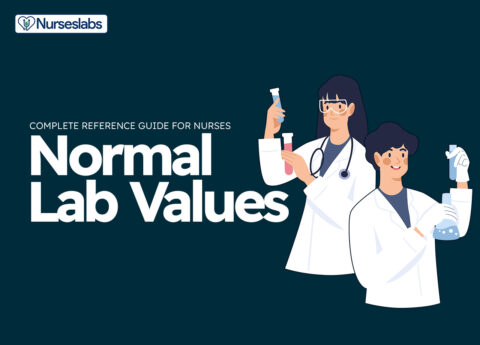


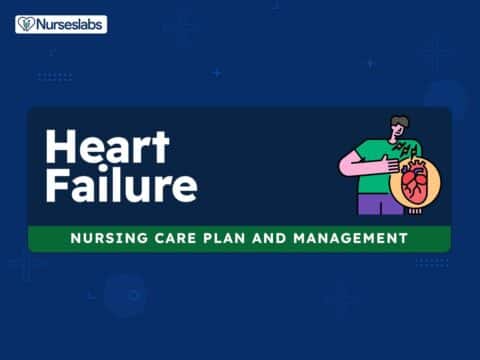

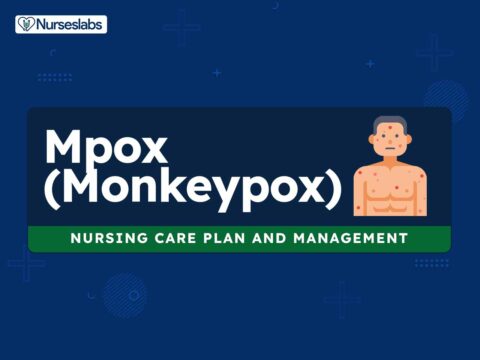


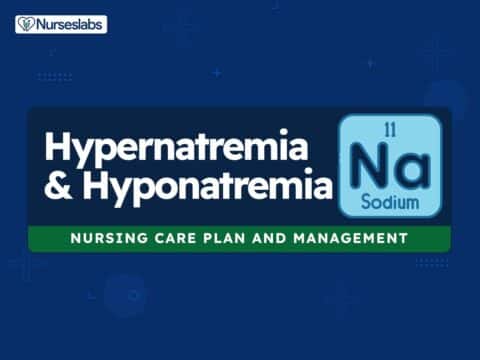


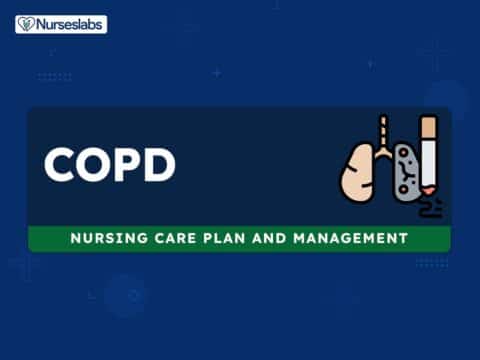
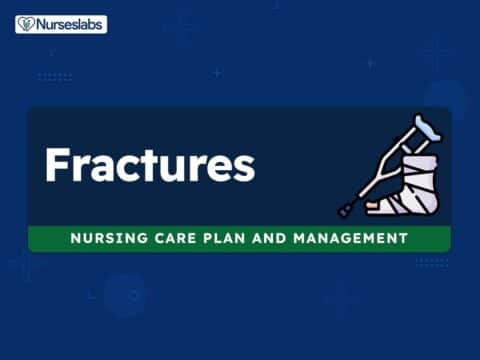
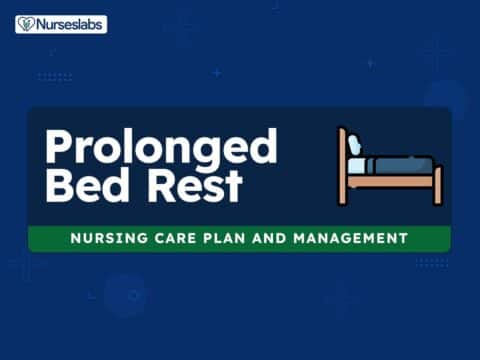
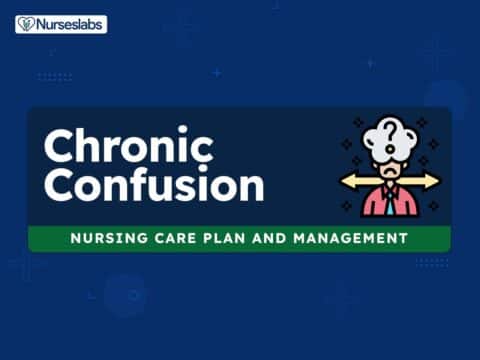
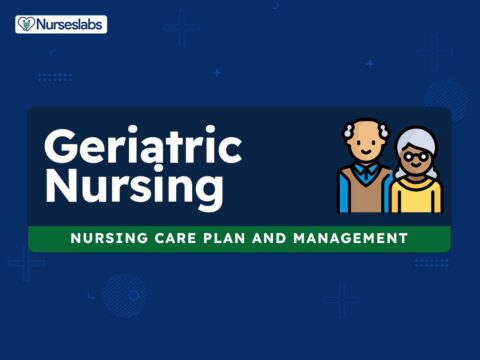
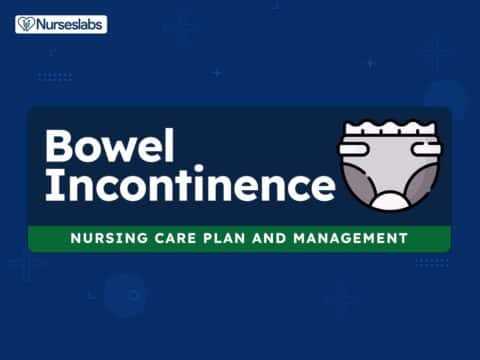
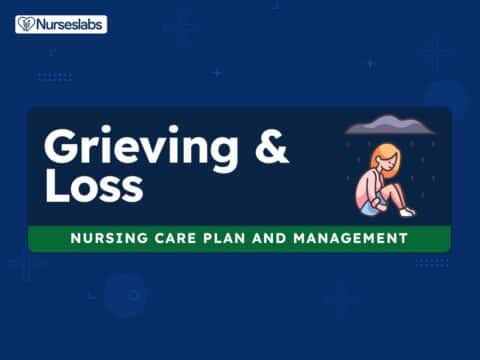
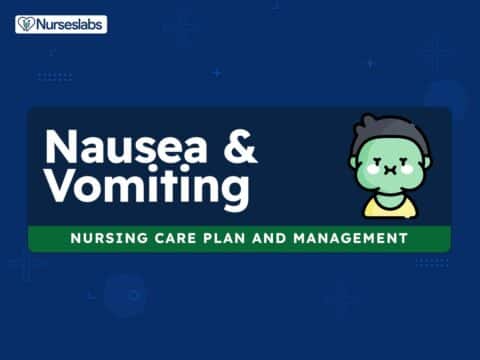
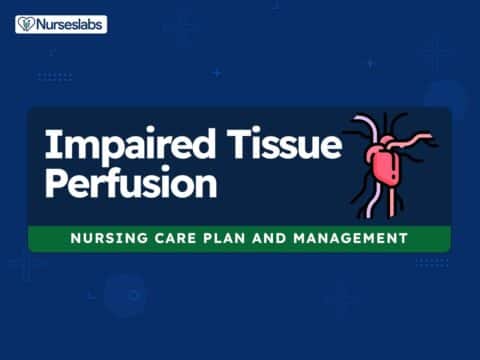

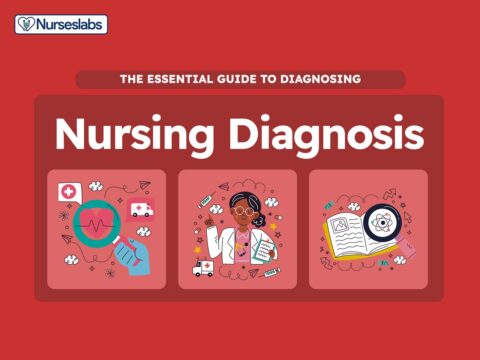
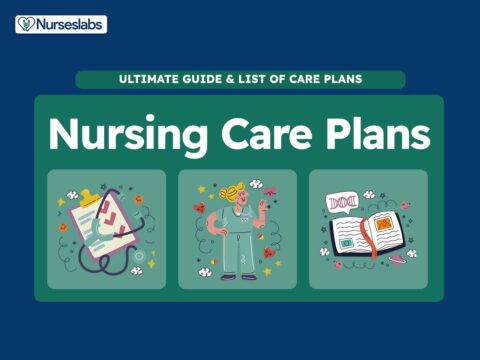
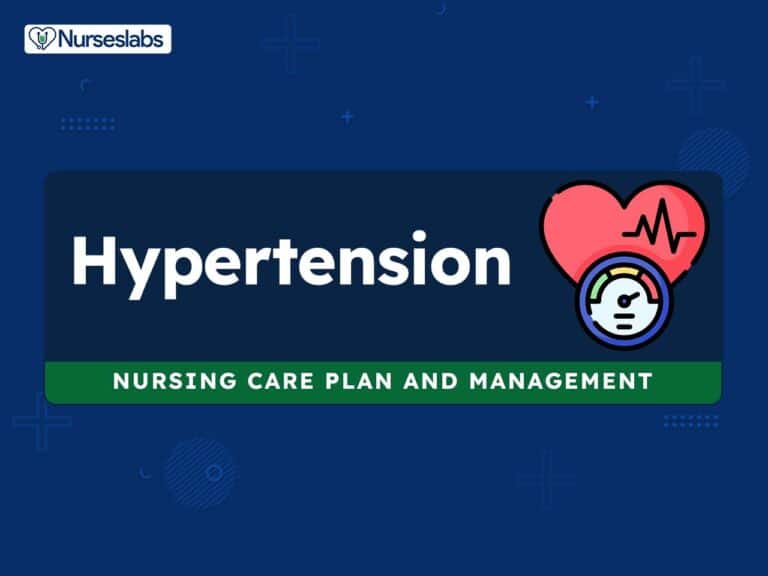


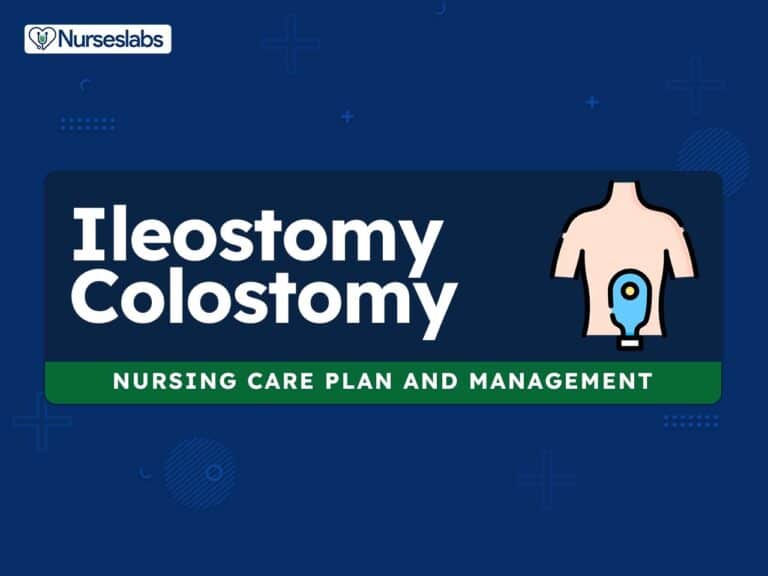


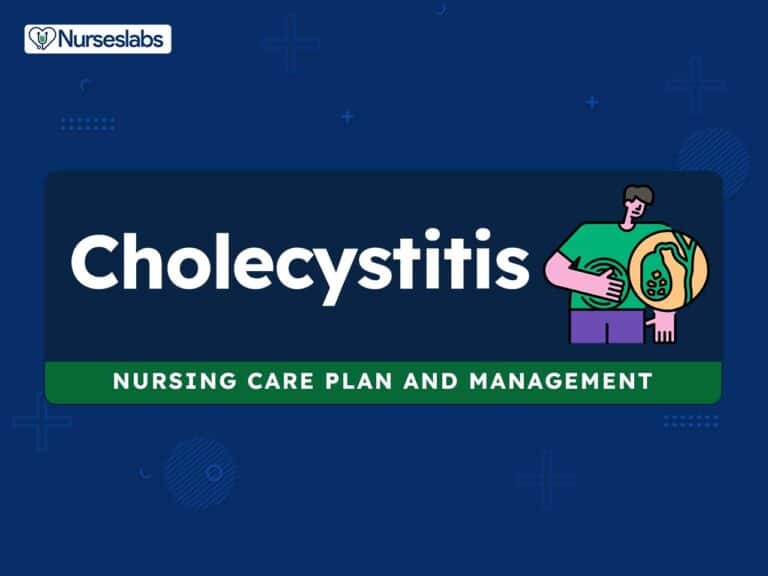
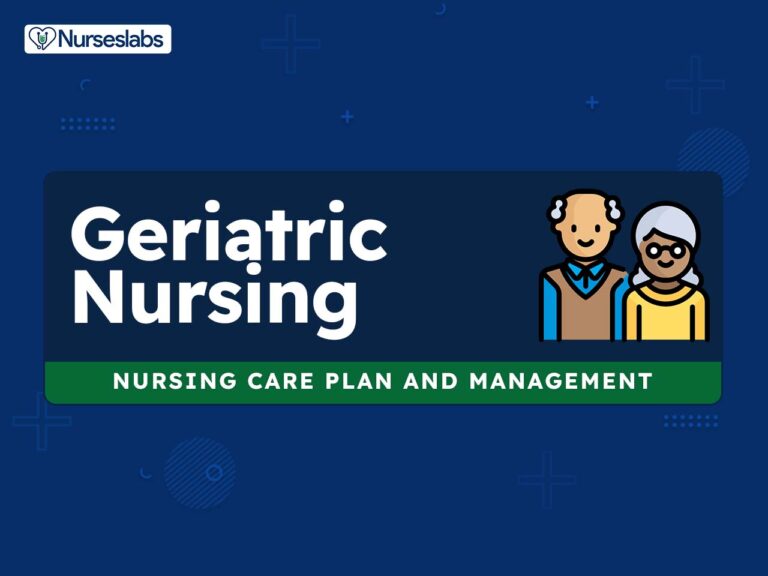
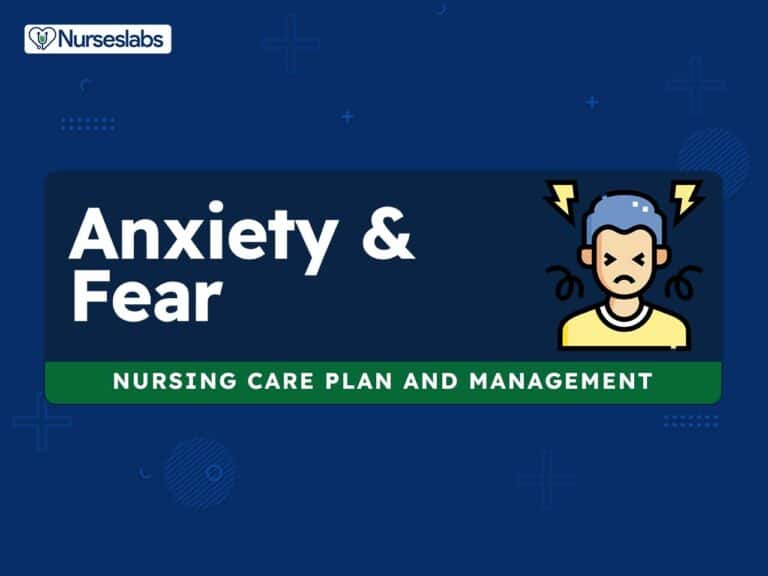
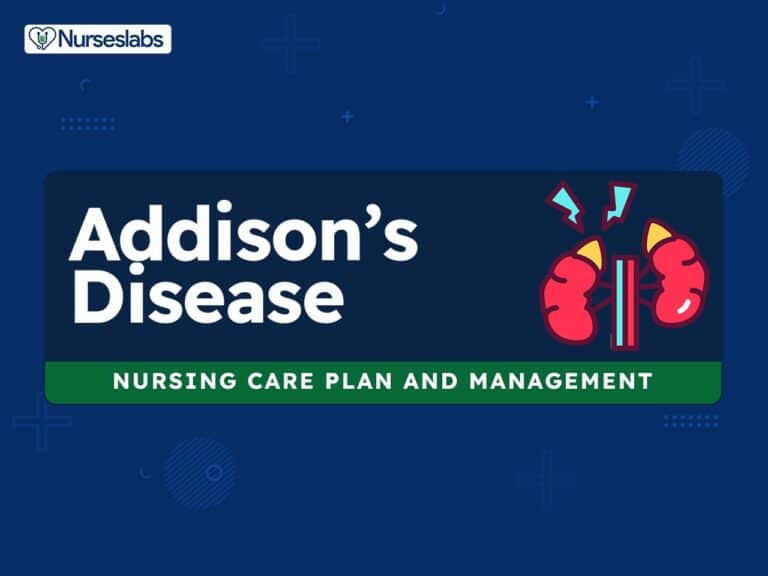
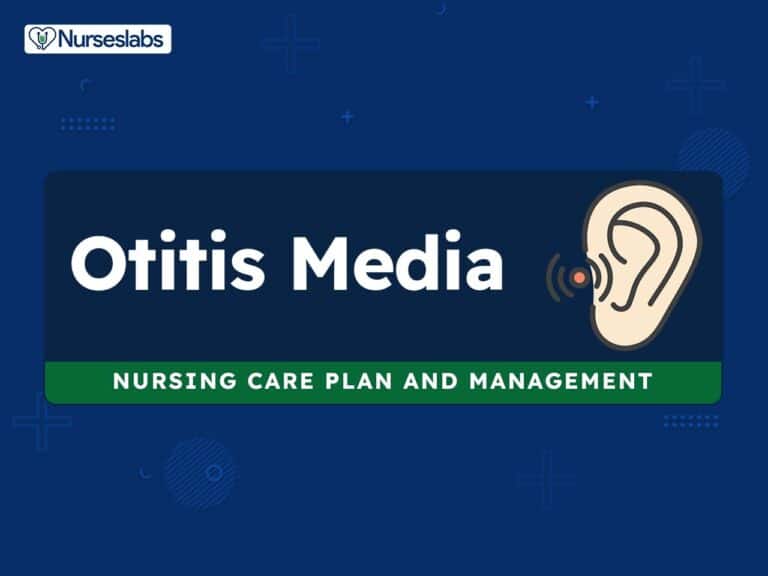

Leave a Comment